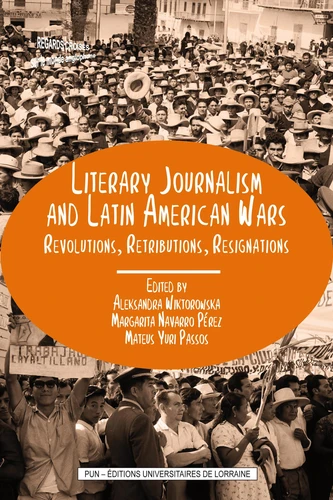Literary Journalism and Latin American Wars. Revolutions, Retributions, Resignations
Par : , ,Formats :
- Paiement en ligne :
- Livraison à domicile ou en point Mondial Relay indisponible
- Retrait Click and Collect en magasin gratuit
- Réservation en ligne avec paiement en magasin :
- Indisponible pour réserver et payer en magasin
- Nombre de pages262
- PrésentationBroché
- FormatGrand Format
- Poids0.46 kg
- Dimensions16,0 cm × 24,0 cm × 1,4 cm
- ISBN978-2-8143-0560-1
- EAN9782814305601
- Date de parution09/07/2020
- CollectionRegards croisés sur le monde a
- ÉditeurPresses Universitaires Nancy
Résumé
Born from colonialist and postcolonialist affronts and affinities with European and North American traditions, as well as from specific nationalistic needs, cultural as well as political, Latin American literary journalism is arguably a direct product and process of a people's volatile past. Be it a specific reportaje, testimonio or crónica, these reportages stoke more often than calm the political and social unrest frequently associated with the development of South and Central America.
Practised by a number of prominent writers discussed here - Gabriel García Márquez, Rodolfo Walsh, Elena Poniatowska, Euclides da Cunha, Miguel Barnet, Antonio Callado, Leila Guerriero, Mário Neves, Judith Torrea, Tomás Eloy Martínez, Patrícia Campos Mello, Mario Vargas Llosa, as well as Ryszard Kapuscinski and Charles Bowden - Latin American literary journalism documents the continents' many civil wars, revolutions, dictatorships, pogroms and cartel turf wars in the hope that readers today will learn from the past and avoid repeating it.
Practised by a number of prominent writers discussed here - Gabriel García Márquez, Rodolfo Walsh, Elena Poniatowska, Euclides da Cunha, Miguel Barnet, Antonio Callado, Leila Guerriero, Mário Neves, Judith Torrea, Tomás Eloy Martínez, Patrícia Campos Mello, Mario Vargas Llosa, as well as Ryszard Kapuscinski and Charles Bowden - Latin American literary journalism documents the continents' many civil wars, revolutions, dictatorships, pogroms and cartel turf wars in the hope that readers today will learn from the past and avoid repeating it.
Born from colonialist and postcolonialist affronts and affinities with European and North American traditions, as well as from specific nationalistic needs, cultural as well as political, Latin American literary journalism is arguably a direct product and process of a people's volatile past. Be it a specific reportaje, testimonio or crónica, these reportages stoke more often than calm the political and social unrest frequently associated with the development of South and Central America.
Practised by a number of prominent writers discussed here - Gabriel García Márquez, Rodolfo Walsh, Elena Poniatowska, Euclides da Cunha, Miguel Barnet, Antonio Callado, Leila Guerriero, Mário Neves, Judith Torrea, Tomás Eloy Martínez, Patrícia Campos Mello, Mario Vargas Llosa, as well as Ryszard Kapuscinski and Charles Bowden - Latin American literary journalism documents the continents' many civil wars, revolutions, dictatorships, pogroms and cartel turf wars in the hope that readers today will learn from the past and avoid repeating it.
Practised by a number of prominent writers discussed here - Gabriel García Márquez, Rodolfo Walsh, Elena Poniatowska, Euclides da Cunha, Miguel Barnet, Antonio Callado, Leila Guerriero, Mário Neves, Judith Torrea, Tomás Eloy Martínez, Patrícia Campos Mello, Mario Vargas Llosa, as well as Ryszard Kapuscinski and Charles Bowden - Latin American literary journalism documents the continents' many civil wars, revolutions, dictatorships, pogroms and cartel turf wars in the hope that readers today will learn from the past and avoid repeating it.


